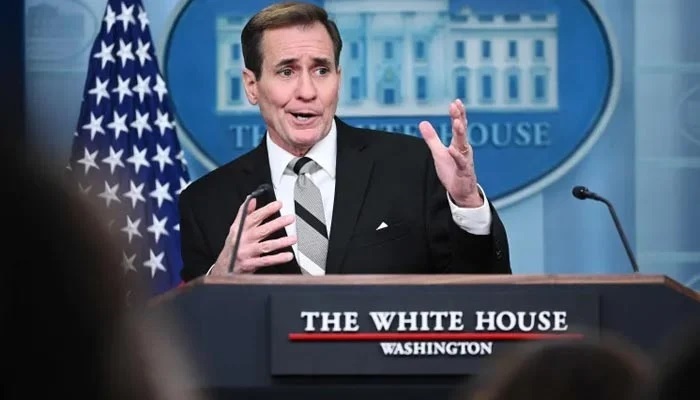- Will remain committed to working with Pakistan on common threats.
Islamabad: Senior White House official John Kirby has made it clear that while the US has recognized Pakistan’s important role in counter-terrorism efforts over the years, it has never been a formal ally bound by treaty obligations.
At a Washington briefing, White House National Security Communications Adviser John Kirby spoke bluntly about the nature of the US-Pakistan relationship, highlighting the absence of a formal defense treaty.
Pakistan has never been a technical ally of the US. I mean there was no alliance agreement with Pakistan,” he said in response to a question.
Nevertheless, Kirby stressed the long history of cooperation between the two countries, particularly in combating terrorism in the volatile border region of Afghanistan and Pakistan.
“Certainly, over many, many years over the last two decades, we have partnered adequately with Pakistan to deal with the threat of terrorism that still exists on this backbone between Afghanistan and Pakistan. is,” he explained.
Will remain committed to working with Pakistan on common threats
At the same time, Kirby also acknowledged the human cost of terrorism in Pakistan, acknowledging that its citizens are victims of cross-border violence.
“We recognize that Pakistan is still — still the people of Pakistan are victims of terrorist violence coming across that border.
“And we have, and as long as we’re in office, committed to working with Pakistan to address these shared threats and challenges. And that’s not — that hasn’t changed. That’s not going to change. There it is,” Kirby said during the briefing.
In August last year, State Department spokesman Vedant Patel urged the United States to stop groups like the banned militant group Tehreek-e-Taliban Pakistan (TTP) from using Afghanistan as a base to launch terrorist attacks against neighboring countries. He reiterated his commitment.
The following month, State Department spokesman Matthew Miller asserted that the United States would “stand shoulder to shoulder with Pakistan in the fight against terrorism”.
According to the Home Ministry, 351 civilians and 573 personnel of Law Enforcement Agencies (LEAs) lost their lives in 1,566 incidents of terrorism in the first 10 months of 2024.
The admission reflects a broader trend in the Biden administration’s policy toward Pakistan: a focus on shared security challenges while avoiding deep strategic commitments. Washington’s reluctance to treat Pakistan as a formal ally mirrors its broader approach to avoiding entanglement in Pakistan’s internal political dynamics.
For example, when asked to comment on the alleged firing at a PTI rally on November 26, State Department spokesperson Matthew Miller maintained a measured stance.
“We want any protest to be peaceful, and we want the government of Pakistan, as is true with any government around the world, to respectfully engage with peaceful protests and treat them peacefully,” he said. be dealt with properly”.
This cautious attitude also extends to strategic issues like Pakistan’s missile program. Last month, when the United States sanctioned three Pakistani firms for their alleged involvement in supporting the country’s missile program, Deputy Spokesman Patel explained the reasoning behind the decision.
“These sanctions that we have imposed on Pakistan are rooted, as I have said three times now, in our long-standing concerns about their long-range ballistic missile program. There is no impact on other areas of cooperation between,” said Patel.
The Biden administration’s messaging therefore signals a deliberate attempt to balance criticism with the preservation of an active working relationship, particularly in counterterrorism.













